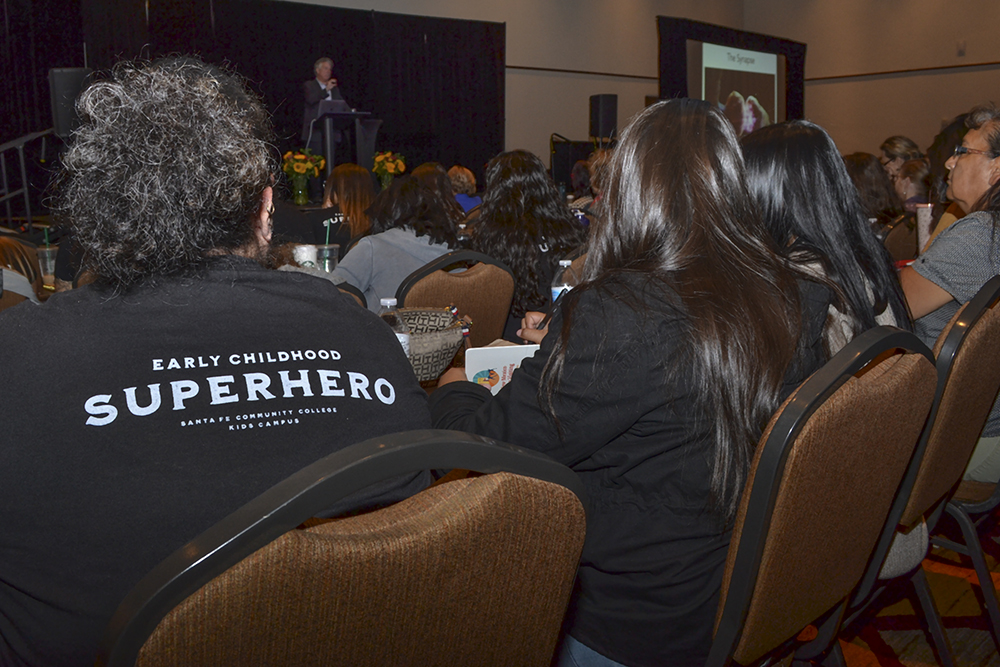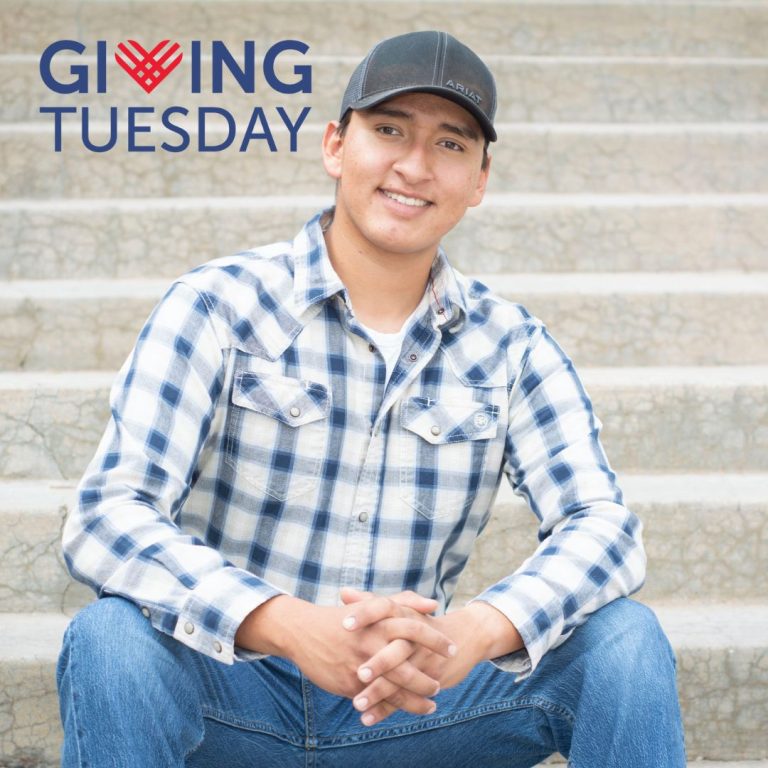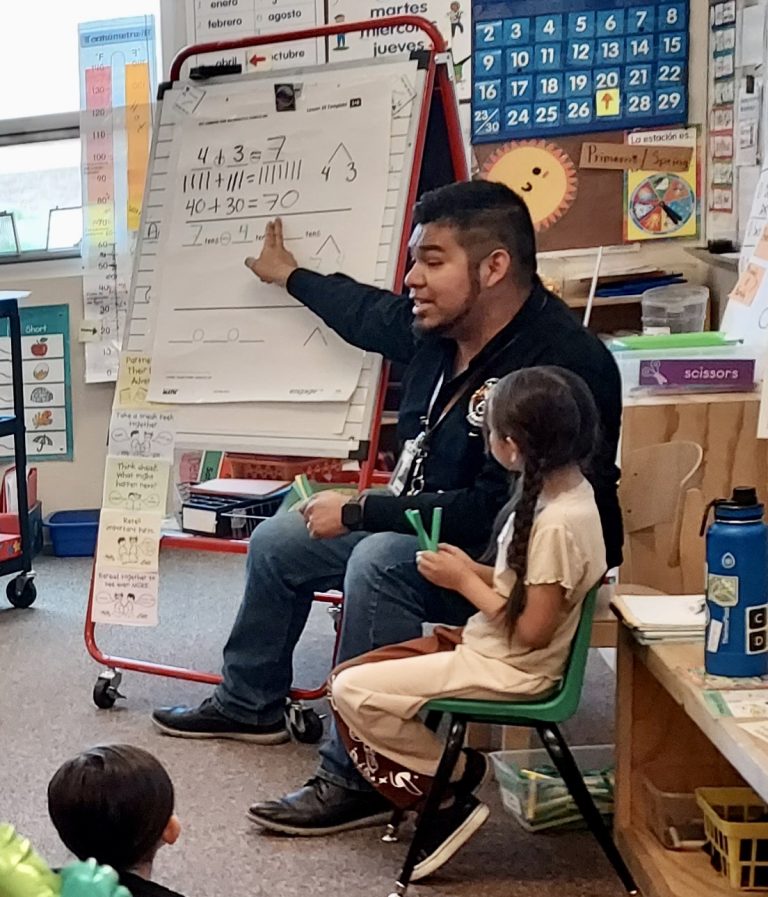Positive Relationships Identified as the Antidote to Childhood Trauma
The Early Childhood Symposium and New Mexico Home Visiting Summit, co-sponsored by Santa Fe Community College Early Childhood Center of Excellence and the LANL Foundation, was held at the Santa Fe Community Convention Center on September 16 and 17, 2019. Keynote speaker Dr. Bruce Perry, a prominent child psychiatrist, author and consultant known for his research and clinical work with traumatized children, praised New Mexico for retaining traditional family structures, a key factor in fostering childhood wellbeing.
“New Mexico has a lot of families that live in extended family settings,” Perry said. “There are many people who still are very close either to traditional family units that have their basis in indigenous culture or in Latino culture, where it was completely normal for aunties and uncles and grandmas and grandpas to live in the same space and spend tons of time with each other.”
As Perry described the impacts of childhood trauma on brain development, he explained why those extended families are so important and the critical role home visitors play when those traditional support systems break down.
Perry highlighted how every experience in life is filtered through the limbic area of the brain, the area most dominated by emotions, memories and instincts. Positive and negative early childhood experiences shape the limbic brain’s perception of the world, which impacts the way the child will perceive and react to outside input the rest of his or her life. An infancy predominated by traumatic experiences puts children at risk of everything from poor performance in school to substance abuse and criminal behavior as they move into their teen years and adulthood.
“The number one thing that decreases your risk is connectedness, how connected you are in family, culture, community,” Perry said. “If you’re connected in healthy ways, you can buffer present stressors, and that connectedness allows people to heal from past developmental trauma.”
The unintended consequences of the disconnect among nuclear families and communities is a profound increase in what Perry calls “relational poverty.” He contends that human beings were meant to distribute parenting and caregiving responsibilities among multiple adults. Until recent history, humans lived in larger, multigenerational groups in which an average of four adults helped raise each child, creating the perfect climate for connectedness and developmental learning. He urged New Mexicans not to move away from traditional family structures.
“The greatest gift that we have as a species is that we are neurobiologically, physiologically designed to be interconnected, to be interdependent, not independent,” Perry said. “The ultimate irony of a lot of our childrearing practices is that we have the fantasy that we’re helping children grow up to be independent. There’s no human being on the planet that’s independent. We can’t be independent. We are meant to be interdependent. Our neurobiology is about connectedness.”
That interconnectedness also influences what Perry called our second great gift: the rapid rate of brain development in utero and in the first years of life. He spoke about how development of social skills and empathy are aligned with consistent patterns of healthy adult interaction during that formative period, with numerous opportunities to practice conversation and appropriate social touch and to watch and read other people’s nonverbal cues in social situations.
“Home visiting programs are the beginning of a set of remedies to recapture those gifts and to act on them. Home visiting programs are basically a modern invention to try to recapture some of the relational wealth that was present in healthy previous generations.”
Perry stressed how home visiting programs help fill the gaps created by society’s current fragmentation, in which one- or two-parent families often live in isolation. The 2000 census recorded fewer than three people in a typical American household. He noted that many New Mexicans are dealing with physical and social isolation combined with limited resources and trauma spanning several generations, which means that many parents have few means of support fo their developing child.
“This is where home visiting is a lifeline,” Perry said. “Having somebody connect with and come to that home and be present to help support the parent and the children is something that literally can save somebody’s life.”
Perry called relationships the most powerful and flexible way to buffer the impacts of stress and trauma on a person’s health and welfare. He repeatedly emphasized how important it is for home visitors to create those relationships with the families they work with.
“You may not realize it right now, but you are involved in probably the single most important public health, mental health, criminal justice, education intervention in the western world,” Perry stressed.
Perry discussed ways in which home visitors can encourage better relationships with families and ended with words of praise for those committed to the profession.
“I want to let you know that I think what you do is really, really important. It’s changing the lives of children and families and it really is going to have transgenerational echoes. You are all working with people who have been impacted by multigenerational trauma, and you are involved in a process of reversing that. You’re helping to build resilience.”
The Local Perspective
The New Mexico Home Visiting Summit included addresses by New Mexico’s Governor and Lieutenant Governor, breakout sessions with local experts and regional community reflection gatherings for networking and discussion. Gov. Michelle Lujan Grisham opened the conference, reiterating her commitment to early childhood initiatives, including universal home visiting and quality childcare.
“I couldn’t be prouder than being in front of a group that puts children and the wellbeing of families first, who never stopped believing that we can make a difference, that never let the state’s data point (which is terrible) deter you. It never stopped you from getting up in the morning, never stopped you from fighting, never stopped you from protecting another child, another family, the same family, every family,” Lujan Grisham said.
During the Home Visiting Summit, the second event of its kind offered by the LANL Foundation with support from the W.K. Kellogg Foundation and other sponsors, Early Childhood Program Director Anna Marie Garcia expressed gratitude to conference participants for the work they are doing to address childhood trauma.
“Through universal home visiting, it’s our job to watch, listen and support families, regardless of place, language, or economic status,” Garcia said. “I thank you for the hard work you’re doing in helping to prevent adverse childhood experiences and toxic stress in our young children.”
Breakout sessions included presentations on how early childhood programs can impact crime prevention, ways to alleviate early childhood trauma, including prenatal drug exposure and newborn intensive care and how connection and healing can occur through familial and cultural relationships and through the arts. (View the breakout session presentations.)
Regional Community Reflection & Integration Sessions encouraged participants to reflect on what they had experienced, to share how they planned to integrate that into their work and learn from others in their part of the state.
“After two days of talking about adverse childhood experiences and their effect on brain development with a hint of what positive childhood experiences can do and the healing effects, it seems like that’s the direction all of us are craving. Working with these parents helps them experience positive connections,” one home visitor said.
Many participants wanted to know how they could have a more direct connection with policymakers and impact policy decisions. Master of Ceremonies Marisol Atkins, a consultant for Luz del Sol, LLC, urged participants to focus on developing community resources.
“As much as the state systems want to help—and I don’t dismiss that at all—it’s your hearts, your voices, your relationships that you build in your communities with your people that are going to make the change,” Atkins said. “I think the real power comes from each of you.”
New Mexico Lt. Governor Howie Morales closed the conference by sharing his own experience with home visiting, in which he and his wife—despite their advanced degrees—“learned things we didn’t even know we didn’t know.” He called the home visitors “changemakers.”
“You provide a service to families that is much more than just information, resources and answering questions,” Morales said. “You’re empowering them to be the parents that we know they are capable of being, giving them the knowledge that’s necessary to have success in raising their children.”
Breakout Session Highlights
View Presentations
Adverse Childhood Experiences (ACEs) Ripple
Layne Kalbfleisch, M.Ed., Ph.D.; Educational Psychologist, Cognitive Neuroscientist; CEO, 2E Consults, LLC (above)
ACE Prevention, the Doorway to Crime Prevention
Raúl Torrez, Second Judicial District Attorney (above)
Coordinated Approaches for the Plan of Care
Andy Hsi, MD, MPH; Co-Chair, New Mexico CARA Work Group; Medical Director, University of New Mexico Hospital (UNMH) ADOBE Program, UNMH FOCUS Program; University of New Mexico (UNM) Health Sciences Center Institute for Resilience, Health and Justice (above)
Cynthia C. Chavers, LMSW; Co-Chair, New Mexico CARA Work Group; Federal Reporting Bureau Chief and Tribal Liaison, New Mexico Children Youth and Families Department
Susan Merrill, LCSW; New Mexico CARA Task Force Member; Community and Social Services Coordinator for Birth Defects, New Mexico Department of Health, Family Health Bureau, Children’s Medical Services
When Hospital Becomes Home
Peggy MacLean, Ph.D., IMH-III; Clinical Psychologist and Associate Professor, UNM Center for Development and Disability (above)
Art as Medicine
Roger Montoya, Artistic Director and Co-founder, Moving Arts Española (above)
For Malachi, Tsay Pin
Matthew J. Martinez, Ph.D.; Deputy Director, Museum of Indian Arts and Culture; former 1st Lieutenant Governor of Ohkay Owingeh (above)
Jovanna Archuleta, MBA; Pueblo Outreach Coordinator, LANL Foundation
Thank You to the Conference Sponsor



